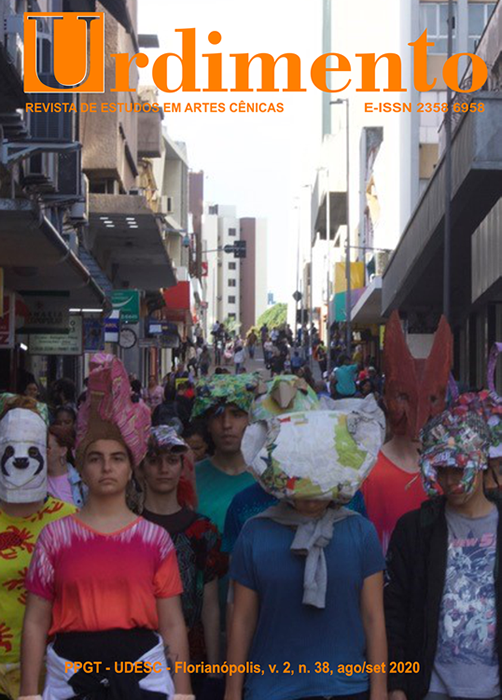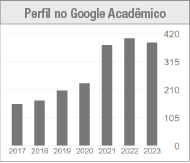The presence of laugh in Capoeira Angola
DOI:
https://doi.org/10.5965/14145731023820200041Keywords:
Malandragem, Capoeira Angola, Laughter, Laughable, GameAbstract
In this article we analyze the presence of laughter in the roda of Capoeira Angola, using as main fields of analysis the archetype of the trickster and the ethics of trickster style. Laughter is a socio-anthropological phenomenon that establishes the humor and the comic in the absurdities of existence and in the perception of the personal maladjustment or distraction of the individual in relation to social customs. In the popular thinking the archetype of the malandro evokes cunning, wit and ingenuity, and is highly praised among the Angoleiros. The malandragem in Capoeira Angola is discussed here from the corporal dimension, with emphasis on the game, on the joke and especially on the laughter. We analyze the course of trickster style as something that was consolidated in Brazil at the beginning of the 20th century and has greatly influenced the practice of capoeira to the present day.
Downloads
References
ABIB, P. R. J. Capoeira Angola: cultura popular e o jogo dos saberes na roda. 2004. Tese (Doutorado em Educação) - Universidade Estadual de Campinas, Campinas, São Paulo, 2004.
ABREU, F. O barracão do mestre Waldemar. Salvador: Organização Zarabatana, 2003.
ALBERTI, V. O riso e o risível na história do pensamento. Rio de Janeiro: Jorge Zahar, 2011.
ALMEIDA, M. A. D. Memórias de um sargento de milícias. São Paulo: Klick, 1997.
BAKHTIN, M. A cultura popular na idade média e no renascimento: o contexto de François Rabelais. Trad. Yara Frateschi Vieira. 8a. ed. Brasília: Hucitec, 2013.
BARNI, R. A Loucura de Isabela e outras Comédias da Commedia Dell`Arte. São Paulo: Iluminuras Ltda., 2003.
BASQUES, M. O riso como expressão de um modo de entendimento: do bergsonismo à antropologia. Scientiae Studia - Revista Latino-Americana de Filosofia e História da Ciência, São Paulo, 9, n. 1, p. 105-128, 2011. Disponível em: <https://doi.org/10.1590/s1678-31662011000100006>. Acesso em: 4 set. 2019.
BERGSON, H. O riso – ensaio sobre a significação da comicidade. Tradução de Ivone Castilho Benedetti. São Paulo: Martins Fontes, 2004.
BRUM, J. T. O riso e a jubilação. In: KANGUSSU, O. I., et al. O cômico e o trágico. Rio de Janeiro: 7Letras, 2008. Cap. 4, p. 56-58.
DAMATTA, R. A casa e a rua: espaço, cidadania, mulher e morte no Brasil. 5. ed. Rio de Janeiro: Rocco, 1997.
DIAS, A. A. Mandinga, manha & malícia: uma história sobre os capoeira na capital da Bahia (1910-1925). Salvador: EDUFBA, 2006.
FALCÃO, J. L. C. O jogo da capoeira em jogo e a construção da práxis capoeirana. 2004.Tese (Doutorado em Educação) - Universidade Federal da Bahia, Salvador, 2004.
LIGIÉRO, Z. Malandro divino: a vida e a lenda de Zé Pelintra, personagem mítico da lapa carioca. Rio de Janeiro: Record, 2004.
MOREIRA, A. Canjiquinha: alegria da capoeira. Salvador: A Rasteira, 1989.
MURICY, C. Viva Pastinha. Ministério da Cultura do Governo Brasileiro, 52 min., 1999.
PANTANO, A. A. A personagem palhaço. São Paulo: UNESP, 2007.
PAVIS, P. Dicionário de Teatro. Trad. Maria Lúcia Pereira e Jacob Guinsburg. São Paulo: Perspectiva, 1999.
REIS, L. V. S. O mundo de pernas para o ar: a capoeira no Brasil. São Paulo: Publisher Brasil, 1997.
SALVADORI, M. A. B. Pedaços de uma sonora tradição popular (1890–1950). Universidade Estadual de Campinas. Campinas, São Paulo, 1990.
SILVA, R. L. Mandinga da rua: a construção do corpo cênico a partir de elementos da cultura popular urbana. 2005. Dissertação (Mestrado em Artes) - Universidade Estadual de Campinas, Instituto de Artes, Campinas, São Paulo, 2005. Disponível em: <http://www.repositorio.unicamp.br/handle/REPOSIP/284844>. Acesso em: 4 ago. 2019.
Downloads
Published
How to Cite
Issue
Section
License
Copyright (c) 2020 Urdimento - Revista de Estudos em Artes Cênicas

This work is licensed under a Creative Commons Attribution 4.0 International License.
Copyright Statement
The articles published by the magazine are free to use. The copyright is all assigned to the magazine. The articles whose authors are identified represent the expression from the point of view of their authors and not the official position of the journal Urdimento. The author (s) undertakes whenever publishing material relating to the article published in Revista Urdimento mention the said publication as follows: This article was originally published by Urdimento magazine in its volume (put the volume), number (put the number) in the year of (put the year) and can be accessed at:
http://www.revistas.udesc.br/index.php/urdimento
This work is licensed under a Creative Commons Attribution 4.0 International License.




